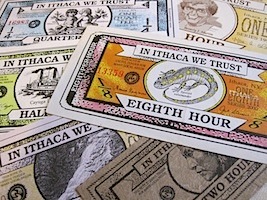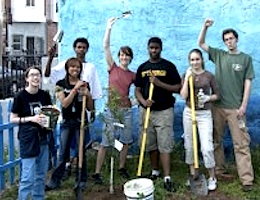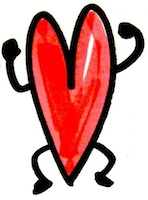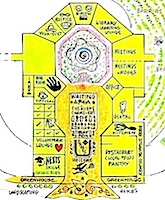




 |
 |
 |
 |
 |
| PAUL
GLOVER ESSAYS: community
control of food, fuel, housing, health care,
planning, education, finance. |
| HOME | INTRO | CURRENCY | SUCCESSES | HOW-TO BOOK | PUBLICITY | ESSAYS |
|
Letters from Nicaragua
by Paul Glover, The Grapevine, June 1986 3/28/86 Recently I returned from a wild corner of Nicaragua, the Rio San Juan, near the Costa Rican border. San Carlos is piled on a hill by the river where the raod ends at the jungle. Along three mud streets stand old board houses. Tin roofs bark at the wind. Trillions of green bugs clog the sky and carpet everyting like moss. Chandeliers of spider webs cover the light bulbs. Thousands of bats can't clear the air. At night grillos make loud glubbering sounds, in classic tropical movie style. Women sweep the dirt from the dirt in front of their homes, and walk to church. Dugout canoes carry men to fish and fish to market. The town swarms with kids, chickens and pigs. Maria Leila says that San Carlos, the capitol of one of Nicaragua's nine regions, is "more civilized" than settlements farther along the river. Here we have electric lights and an occasional drain pipe.  A family invites me to visit the jungle, so I toss my sack aboard their boat. Our motor splits the quiet water, launching tall white cranes into the sky and tortoises into the dip. After two hours, we enter Rio Sabalos and the world becomes dense green as the river narrows. At this place, a crude road begins which goes to Buena Vista. The route twists and kicks up and down, stomps holes and hops over broken bridges. Farmers with mules trade rice, beans, watermelons, coconuts, and bananas. A few Sandinista soldiers patrol on horse and foot. An Easter procession of campesinos carrying a large wooden cross passes, protected by another soldier. People greet us country style, with hands pressed together as in prayer. Deep in the jungle, we reach a resettlement camp, established to gather isolated families threatened by the Contras. Many have been killed in this area. At Buena Vista the Quiros family buys a chicken from relatives. The children catch it and soon it is soup for twenty. We are talking about crops, baseball, rain, water supply, who has good watermelons. The hogs sniff our plates and are ordered back. School will start soon: they are learning to read. The radio plays Stevie Wonder's "Part Time Lover." Most music is from the U.S. The only television within 30 miles is broadcasting Perry Como from Sea World. They think America must be a beautiful place. No one has ever acted discourteous to this citizen of the country which pays for the destruction of their crops, homes and children. It is almost more Christian 'love of thine enemy' than I can stand. "We are innocent," a woman says. They wish Michael Jackson would visit Nicaragua. I wish Ronald Reagan would visit Nicaragua. He would learn that the U.S. has already conquered every tropical Podunk in this New-York-sized nation. The people would embrace him as a Christian and movie star. Nicaraguans are better friends to democracy than the military dictatorships of Chile, Uruguay, Argentina, Bolivia, Paraguay, Columbia and, until recently, Haiti and the Philippines, which have received generous U.S. support. They confront Daniel Ortega on television as an equal, more bravely than you might dispute President Reagan. They attack government fumbling. Governments do stupid things, history has proven, and the Sandinistas are still apologizing for violently relocating the Miskito Indians. They also bought oil from the Russians right after the 1984 Congressional rejection of aid to the Contras and attacked the Contras inside Honduras during the latest debate on Contra aid. The wartime decree of 1985, limiting civil liberties in some cases, as does the U.S. during war, has little effect on everyday life and is just bad publicity. But do they deserve to be ambushed in the hills? Should Nicaragua be invaded on behalf of its conservative party? Should the U.S. be invaded to save the Democrats? On the whole, I feel more freedom here than in my native land. Freer from crime, cars, television; giant inhmane cities; stores full of popular junk; swaggering police; drug addicts; vengeful god Christians; pressures to be rich; chemical contamination of water, air and food. Nicaragua's problems seem caused by the trade embargo and military threat. They can't repair their tools and presses made in America, in order to produce basic goods. Like people everywhere, they gripe about shortages. They are also self-admitted "grumblers" but also "Sandinistas." They have had much practice being poor. Dictatorship here? What dictatorship would hand out over 200,000 machine guns to peasants? Does the U.S. have representatives from six political parties in Congress? Here every city block and neighborhood has elected repersentatives who have directly elected a proportion of the national Assembly. They are writing a constitution seven years after their revolution, just like the United States did. So, if the U.S. invades, these brown people will fight to the last grandmother, until all 200,000 machine guns melt, then they will switch to machetes. There will be thousands dead including Americans. This is not Grenada, this is Vietnam again. Are you ready? The happiness of children makes war look ugly. I've enjoyed the kids most of all. For them the world is a payground. When I'm tired of satisfying their curiosity about the U.S., I tell them I'm from the moon, which interests them even more. Moon food and water is made of stones so it is harder to eat and swim in. I explain that if there is an invation, I will be here with them. Everyone who votes and pays taxes in the U.S. is directly responsible for their lives. If America really wants to save Nicaragua from Bulgarian generals, Russian teachers of bad English, bookstores full of Lenin, majority vote for the FSLN and military reliance on the Evil Empire, then it will quit funding this cockfight. Americans would see strong political opposition to the FSLN when the war threat ends. When Nicaraguans can no longer blame yankees for their internal problems, they will blame whoever's in power-- and, like I said, these people are armed. Even now, the goverment is ready to quit importing Russian armament if they can rely on the U.S. as an ally. And why not? There is strong popular demand for friendship with the U.S. as a well as for U.S. consumer goods, tools and culture. But on fair terms. When Washington permits free trade again, the works of Lenin will be quickly replaced by whatever Walden Books can supply. Likewise, when they can repair their presses, there will be more freedom of the press. From now on, Nicaragua will be run by Nicaraguans. The U.S., also born in revolution, should have the Christian decency and political sense to respect their clumsy efforts. |
4/16/86 Some of you wondered whom to believe: whether Contras were terrorizing civilians or whether, as Reagan has said, Sandinista are dressing up as Contras and trying to discredit them by committing atrocities. I'll describe the situation and why I think this is not so.  This
little country has a population less than half the size of New
York city, populating an area half the size of New York state (the
other half of Nicaragua is unpopulated jungle), People are
settled
mainly in small cities and towns, with everybody related to everybody
else by blood and marriage. They each have family in a dozen
places,
and buses are always full of travellers taking a chicken to granny,
visiting cousin, second cousin, brother or sister-in-law, going to a
christening of the daughter of the aunt of a godfather, carrying soup
to a nephew's sick stepmother, etc. This is a very intimate
society,
with an extensive informal communication system. People know
each
other. This
little country has a population less than half the size of New
York city, populating an area half the size of New York state (the
other half of Nicaragua is unpopulated jungle), People are
settled
mainly in small cities and towns, with everybody related to everybody
else by blood and marriage. They each have family in a dozen
places,
and buses are always full of travellers taking a chicken to granny,
visiting cousin, second cousin, brother or sister-in-law, going to a
christening of the daughter of the aunt of a godfather, carrying soup
to a nephew's sick stepmother, etc. This is a very intimate
society,
with an extensive informal communication system. People know
each
other.As well, soldiers are trained to be servants of the people. Few drunks or fistfighters in this army. Never seen any arrogance. They are usually stationed near their families and are seen carrying sons or daughters. So it seems to me that, if this murdering has been a secret project of the army to discredit the Contras: * Someone would have come visitng town soon after a massacre (which often happens), see a dead Contra killed by the militia and say, "That's my brother-in-law's brother! Why, he joined the EPS (Sandinista People's Army) seven months ago!" And the story would spread from there. * At least one of the fake Contras would have spilled the beans by now. * There are six opposition political parties which would love to discredit the FSLN and would be quick to condemn their major opponent if they had any evicence, But they've never made this charge. * The risks of such a crime being discovered are too great. Overnight the army would desert, after shooting its commanders. That's exactly the kind of army this is. So I would reassure you that this is another example of untruth fed to Reagan by his advisors, which the President passes on to you. P.S.: A popular slogan is "We are Sandinistas, not communists!" The Communists got four percent of the vote in the 1984 elections.  4/23/86 San Juan del Sur is becalmed beside the ocean, a town too peaceful for a nation at war, in a world howling angry. Gathered around nine streets beside a tranquil beach are happy music, horses, gingerbread bungalows, trees full of cocnouts and mangoes, friendly folks in rocking chairs, tile sidewalks, oxcarts, boatbuilders, schoolkids, piggies and quiet windy nights. The rest of Nicaragua is merely amiable by comparison. There are other good things, too, according to your taste. Body surfing and diving in clean waves. Secluded tidepools. Fine vegetarian meals and fresh lobster. Fising and big fish. One thousand Spanish teachers. Sunsets. Altnough two more items brought me here, I'm tempted to stay for the whole packeage. I'm visiting the windmills of Rivas being repaired by David Parkhurst, and the permaculture (permanent agriculture, or fruit and nut trees) begun by his friend Juanita Senger. We took horses over dusty paths to visit one of Nicaragua's ten thousand Aermotor windmills. Several hundred are in the South Pacific coast, where wind gallops over low hills. On the Contreras cooperativa, a cattle ranch owned by 30 families, windmills are so important that they have names. "El Tigre" is one of six which keep 600 cows alive. Dismounting under a tree beside Tiger, we admire its tower and broad tank of clear water. When the breeze stiffens the blades turn, turning gears which raise and lower a piston, which spills water into the pool. In such heat, surrounded by miles of yellow grass, the concrete pila looks as fantastic as a Roman fondtain. A woman is washing clothes at one end. Her two kids play quietly at the other. Without David's work these machines would grind themselves to powder. Most don't work; they've been abandoned for years. No one has replaced the oil. Some towers are ready to tumble. This one is missing a furling arm, and the leather packings are deteriorated. A cooperante wortks with him, the first to learn his skills. They have a lot to learn. They've been landless cane cutters for generations. Now throughout Nicaragua the right to land and learning is considered part of democracy, like the right to vote. Here private property is still sacred if it feeds children. Idle land is given to peasants. The Ministry of Agriculture approves of David's efforts. They're hunting a building for his workshop, but have no money. So he's selflessly-employed, having put his life savings into the job. Like many who knew Nicaragua only through television news, I came here suspicious but have more and more respect for their ability to get results with scarce resources. They try hard. As does David. Usually he walks nearly an hour just to get his horse, then wrestles a few heavy tools 40 feet up the towers to do urgent work. "I can't make full repairs in the field. I need a vehicle to get the machinery to a shop, which I don't yet have, where I could use the right tools, which I also need." The Rivas region is a deforested jungle where overgrazing has smashed, exposed and cracked the dry earth. He supports the government's promotion of more soybeans and fewer cattle. "Salvaged windmills can be moved to gardens later," he says. "I'd rather see them pump water for a crop which doesn't damage the soil" Even now the soy harvest is served in San Juan as soy tortillas, soy milk, soy shrimp and soy cheese, at the government's Puesto de Soya. The U.S. trade embargo forces Nicaragua to rely on simpler technologies to suply food and fuel. This keeps them from making our mistakes too, like wasting natural resources on luxury products. Because dozens more projects like these also need help, I went back up the road , to the world where newspapers quote the latest accusations against Nicaragua. Our government is trying to protect you and me (and U.S. corporations) from unfriendly dictatorships. but Nicaragua is neither of these. During five months I have seen as much active democracy and religious faith here as in the United States. You'll probably need to visit to believe me... [email protected] |